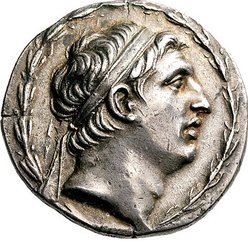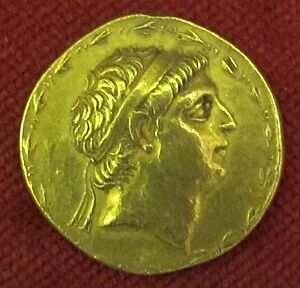Demetrius I Soter facts for kids
Quick facts for kids Demetrius I Soter |
|
|---|---|

Silver tetradrachm of Demetrios I Soter, minted in Soloi, featuring a portrait of Demetrios on the obverse. SC 1611.3
|
|
| Basileus of the Seleucid Empire | |
| Reign | November 162 – June 150 BC |
| Predecessor | Antiochus V Eupator |
| Successor | Alexander Balas |
| Born | 185 BC |
| Died | June 150 BC (aged 34 or 35) |
| Spouse | Laodice V |
| Issue | Demetrius II Nicator Antiochus VII Sidetes Antigonus |
| Dynasty | Seleucid |
| Father | Seleucus IV Philopator |
| Mother | Laodice IV |
Demetrius I (born 185 BC, died June 150 BC) was a king of the Seleucid Empire. He was also known as Soter, which means "Savior." He ruled from November 162 BC to June 150 BC.
Demetrius spent his younger years as a hostage in Rome. He later returned to Syria and took the throne. He overthrew his young cousin, Antiochus V Eupator, and the regent, Lysias. Demetrius became king during a difficult time for the empire. He spent much of his reign fighting off rebellions and challenges to his power. Some of his main rivals were Timarchus and Alexander Balas.
Contents
Demetrius's Early Life and Escape
Demetrius was born around 185 BC. When he was young, he was sent to Rome as a hostage. This happened during the reign of his father, Seleucus IV Philopator. Being a hostage was part of a peace agreement called the Treaty of Apamea. This treaty had ended a war between Rome and the Seleucid Empire.
In 175 BC, Demetrius's father was likely murdered. His uncle, Antiochus IV Epiphanes, then took the throne. The throne should have gone to Demetrius. However, he was too young and still held captive in Rome.
Antiochus IV died in 164 BC. His nine-year-old son, Antiochus V Eupator, became king. But the real power was held by a regent named Lysias. Demetrius was 22 years old at this time. He asked the Roman Senate to let him be king of Syria. But the Romans said no. They preferred a weak Syria ruled by a child, not a strong man.
Two years later, Antiochus V's power was weakened by Rome. Rome sent an official to destroy his ships and elephants. This was also based on the Treaty of Apamea. Demetrius asked the Senate again, but they refused once more.
With help from the Greek historian Polybius, Demetrius escaped from Rome. He traveled to Antioch, the capital of the Seleucid Empire. There, he gained the support of important local leaders. He was welcomed as king in November 162 BC. Demetrius immediately had Antiochus V and Lysias executed.
Historian Polybius was a close friend and advisor to Demetrius. Because of this, Demetrius's early life is very well known. Polybius wrote about it in his book, The Histories.
Demetrius's Time as King
The Romans were not happy about Demetrius becoming king. They secretly encouraged anyone who wanted to break up the Seleucid Empire. This would make it weaker. Some of these people included Timarchus, the Jewish Maccabees, Ptolemaeus of Commagene, and Artaxias I of Armenia.
In Judea, Demetrius tried to stop the Maccabean Revolt. He sent a new High Priest, Alcimus, to Judea. Alcimus managed to get some Jews to follow the government again. Demetrius also sent an army led by Bacchides. This army weakened the Maccabees' power over Judean cities. In 160 BC, Bacchides defeated and killed the rebel leader Judas Maccabaeus at the Battle of Elasa. This brought Judea back under Seleucid control for a few years.
Demetrius earned his nickname Soter (Savior) from the people of Babylonia. He defeated a rebellious leader named Timarchus there. Timarchus had declared himself an independent king. But Demetrius defeated and killed Timarchus in 160 BC. He also removed Ariarathes, the king of Cappadocia. For a short time, the Seleucid Empire was united again.
Demetrius likely married his sister, Laodice V. They had three sons: Demetrius II Nicator, Antiochus VII Sidetes, and Antigonus.
Demetrius's Downfall and Death
Demetrius's downfall was partly caused by Heracleides. He was the brother of Timarchus, the rebel Demetrius had defeated. Heracleides supported Alexander Balas. Balas was a young man who claimed to be the son of Antiochus IV Epiphanes. Heracleides convinced the Roman Senate to support Balas against Demetrius I.
Balas's army landed in Ptolemais and took control. He declared himself king of the Seleucids in 153–152 BC. This meant the Seleucid Empire now had two kings fighting a civil war.
The Jewish people were a small part of Demetrius I's empire. But their story from this time is well known. Jonathan Apphus, Judas Maccabaeus's brother and the new Maccabee leader, made a deal with Demetrius I. This allowed Demetrius to move some Seleucid troops from Judea to fight Balas.
However, Jonathan soon broke his truce with Demetrius. Alexander Balas offered him an even better deal. Balas made Jonathan the High Priest of Judea and a military leader. Jonathan agreed to send Jewish troops to help Balas. Jonathan, who was not from the traditional high priestly family, took the title in 152 BC. When Demetrius heard this, he offered Jonathan more benefits. But Jonathan did not accept. He either trusted Balas more, distrusted Demetrius, or believed Balas would win the war.
Balas defeated and killed Demetrius I in 150 BC. After this, Balas became the only king of Syria.
Legacy
In 1919, the poet Constantine Cavafy wrote a poem about Demetrius's time as a hostage in Rome.
See also
- Timeline of Syrian history
 | Georgia Louise Harris Brown |
 | Julian Abele |
 | Norma Merrick Sklarek |
 | William Sidney Pittman |


